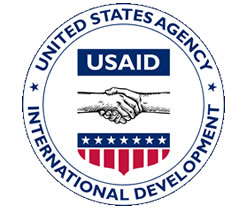 The United States Agency for International Development (USAID), through the U.S. government’s Feed the Future Initiative, launched the National Seed Trade Association of Ghana (NASTAG), in collaboration with the Ministry of Food and Agriculture and other development partners. NASTAG is a partnership between producers, traders, government institutions and processors in the seed industry. The Association aims to spur private sector investment and promote the use of high-quality certified seed. In attendance were, USAID/Ghana Agriculture Team Leader Jenna Tajchman and Deputy Minister of Agriculture Honorable Dr. Sagre Bambangi, who highlighted the importance of growing Ghana’s seed industry to build a food secure future.
The United States Agency for International Development (USAID), through the U.S. government’s Feed the Future Initiative, launched the National Seed Trade Association of Ghana (NASTAG), in collaboration with the Ministry of Food and Agriculture and other development partners. NASTAG is a partnership between producers, traders, government institutions and processors in the seed industry. The Association aims to spur private sector investment and promote the use of high-quality certified seed. In attendance were, USAID/Ghana Agriculture Team Leader Jenna Tajchman and Deputy Minister of Agriculture Honorable Dr. Sagre Bambangi, who highlighted the importance of growing Ghana’s seed industry to build a food secure future.
At the event, seven new Executive Council Members of the Association were inducted into office to grow the competitiveness of Ghana’s seed industry. The Executive Council will work to strengthen the business and technical skills of its members, promote collaboration between seed value chain actors, and advocate on regulations, standardization and the provision of general seed information to all stakeholders.
The Government of Ghana has prioritized seed as a pillar in its flagship agriculture program, “Planting for Food and Jobs,” and NASTAG will play a leading role in its implementation. In Ghana, promoting the growth of the seed industry and ensuring access to quality certified seed has the potential to boost agricultural productivity, as well as enhance food and nutrition security in the country.
“We believe improving the seed sector is critical to Ghana’s economic growth. Developing Ghana’s seed sector is a top priority for USAID and its partners, and today’s launch is a milestone for the sector’s growth,” remarked Mrs. Tajchman. “NASTAG is a critical and necessary organization to develop Ghana’s seed sector.”
USAID and its Feed the Future partners support NASTAG with strategic planning, technical assistance, and increasing access to quality seeds for Ghanaian farmers. In Ghana, Feed the Future works to enhance agricultural productivity, links farmers to market and trade opportunities, and boost the nutrition of the most vulnerable populations.























